85. The First Trained Army. But Western Europe put more hope in the orderly troops that had been getting ready during that winter and summer. A great army was prepared, commanded by the best generals. The number of knights and their followers was very large indeed; three hundred thousand, some say, while others believe it was even larger. They came from several countries, but the French soldiers were the flower of the army. Each leader took his followers by a, different route, but all agreed to meet at Constantinople. This was one of the richest and most beautiful places the Crusaders had ever seen. How overjoyed they were when the spires of that great city broke on their sight! They lifted up their voices in shouts of joy and praise.
But the emperor was 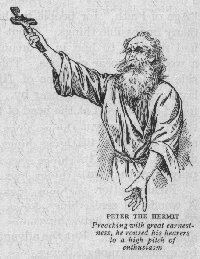 now sorry he had asked the pope to send him soldiers to conquer the Turks. For many of the Crusaders wanted to conquer them not for the eastern emperor but for the lands they would thus win and rule over. They quarreled, and came to hate each other almost as much as both hated the Turks. Therefore the emperor greatly rejoiced when the Crusaders had passed over into Asia Minor.
now sorry he had asked the pope to send him soldiers to conquer the Turks. For many of the Crusaders wanted to conquer them not for the eastern emperor but for the lands they would thus win and rule over. They quarreled, and came to hate each other almost as much as both hated the Turks. Therefore the emperor greatly rejoiced when the Crusaders had passed over into Asia Minor.
The Turks were hardly ready for the knights of the West. They believed them to be another helpless crowd, half starved and poorly led. What a mistake! Here were some of the best and bravest soldiers of Europe, and the Turks proved no match for them. So the Crusaders captured the old Asiatic town of Nicaea, where the first band of Christians had been defeated.
After this first great victory the Christian soldiers hurried southeastward to the ancient city of Antioch, a walled town and well fortified. But the Turks were brave and fought well. They did not yield so quickly this time. Many of the Crusaders grew discouraged. Some became homesick and returned to their native land. Victory seemed far away. They had been fighting for over three months.
86. The Wonderful Spear. This has been called the “Age of Faith,” for people in that far-off time believed many impossible things. About this time a pious monk had revealed to him in a dream —so the story goes— a wondrous spear or lance. This spear had pierced the side of Jesus at the time of His crucifixion, and now lay buried in a church near by. If this lance were once found and carried at the head of the army nothing could stand in the way of victory. The monk told the Crusaders that three times he had been assured of this in his dreams. But to find the Holy Lance much fasting and prayer by the Crusaders were necessary.
Finally, after long searching, the spear was found. A wonderful zeal now seemed to seize the entire army. They rushed to battle, stormed the walls, broke through, and Antioch fell. But the advantage gained was lessened by quarrels among the leaders as to who should rule the city and the surrounding region.
It was not until the spring of 1099 that the crusading host, by this time much smaller in number, reached the city of Jerusalem. Here, too, they found a walled city, in a 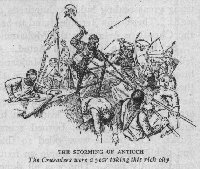 region where the springs or wells had all dried up. It was almost impossible to get water, and there was great suffering among the soldiers and their horses.
region where the springs or wells had all dried up. It was almost impossible to get water, and there was great suffering among the soldiers and their horses.
But in spite of these hardships the Crusaders went bravely to work to capture the city. After many days of hMd fighting there seemed little prospect of success. But agaom their faith was put to the test. Some leaders declared that, in a vision, they had been told that if the army should march around Jerusalem, barefooted, for nine days, the city would fall.
That was indeed a strange procession which the Mohammedans saw—a barefooted army marching around their city, with bishops at their head, and every one chanting hymns. No wonder the infidel Turks mocked from their walls as they watched. Instead of fighting, these bold. soldiers of the western world were singing songs and reciting prayers! So the Mohammedans thought.
Suddenly these praying soldiers were turned into fighting demons. The city was stormed from two sides at once. Showers of stones were hurled at the Turks; huge battering rams pounded great holes in the walls, through which many of the Crusaders poured, and by using great scaling ladders, hundreds climbed upon the walls. There was terrible hand-to-hand fighting, and the Christians overcame the Mohammedans.
 87. How the Crusaders Acted. At last the city fell. But such a victory! Maddened by the long, brave fight of the Turkish defenders, the Christians put them to death by the most horrible cruelties. Mohammedans had their heads cut off, were shot through by arrows, or were driven to leap from high towers. Not satisfied, the Christians burned scores and scores of Turks. The bodies were piled so thick in the streets and public squares that people on foot or on horseback could hardly pass. This was all done in the name of the gentle Jesus who had taught His followers a very different lesson.
87. How the Crusaders Acted. At last the city fell. But such a victory! Maddened by the long, brave fight of the Turkish defenders, the Christians put them to death by the most horrible cruelties. Mohammedans had their heads cut off, were shot through by arrows, or were driven to leap from high towers. Not satisfied, the Christians burned scores and scores of Turks. The bodies were piled so thick in the streets and public squares that people on foot or on horseback could hardly pass. This was all done in the name of the gentle Jesus who had taught His followers a very different lesson.
The Crusaders had won, and Jerusalem was in their hands. They appointed one of their great soldiers to rule over it and the country around. The city and the near-by land were called the Kingdom of Jerusalem.
Hundreds of the Crusaders returned home to greet their loved ones who had so long waited and prayed for them. But thousands did not return. They were filling unknown graves along the Danube, in the land of the Hungarians, or in the Holy Land. Yet the souls of those who died fighting the Turks were happy, according to the teachings of that strange time and the belief of all the Crusaders.
Many new bands of Crusaders were constantly arriving in Asia minor, for the Holy Land had to be guarded. The Turks were brave, and refused to give up easily. They kept on fighting much of the time, and fifty years (1144) after the pope called the brave sons of Western Europe to the First Crusade, news came that the Turks were again victorious and had captured one of the most important strongholds of the Christians.
88. The Second Crusade. The Second Crusade was preached by an eloquent man whose title was St. Bernard. Two kings, one of France and one of Germany, gathered their hosts. St. Bernard told the bold warriors of the West that it was their duty to march with all haste and retake the Holy Land from the wicked Turks. He pictured the awful sufferings of the Christians in the hands of their enemies, and promised everlasting happiness for those who, having repented, fell in the glorious struggle. The Second Crusade did but little to win back the places held by the enemies of Christianity.
89. The Third Crusade. This was the crusade of Richard the Lion-Hearted. More than forty years had passed since St. Bernard called the men of the west to the Second Crusade. News came to Western Europe of the rising power of a great man among the Mohammedans,—Saladin, one of the greatest soldiers and wisest statesmen among the followers of Mohammed. He was kind in his treatment of his enemies; he was a man of his word; what he promised, he did.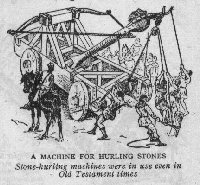
Saladin’s army swept up from Egypt, carrying everything before it, Jerusalem was threatened. The Christian soldiers marched out to meet Saladin in a great battle. But the Mohammedans were victorious. The king of Jerusalem had been taken prisoner and many of the bravest Christians had been killed.
Saladin in turn laid siege to Jerusalem, and the city fell within a short time. (1187) Now the victorious Saladin taught the Christians a noble lesson in warfare. He did not kill a single prisoner, but set every one free.
It was the news of the capture of Jerusalem that 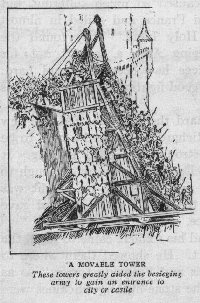 called forth the greatest of the Crusades. The Third Crusade numbered among its heroes Richard the Lion-Hearted, King of England, Frederick Barbarossa, emperor of the Germans, and Philip Augustus, King of France; but the most romantic of these was Richard.
called forth the greatest of the Crusades. The Third Crusade numbered among its heroes Richard the Lion-Hearted, King of England, Frederick Barbarossa, emperor of the Germans, and Philip Augustus, King of France; but the most romantic of these was Richard.
Frederick Barbarossa was also an interesting character. He was so named because of his great red beard. He was a man seventy years old, full of energy and courage, a true son of Germany. His army was the first to get ready, but the great man lost his life in Asia Minor while swimming a river. His soldiers lost heart. Some returned home, but most of them fell in battle.
Philip and Richard were wiser. 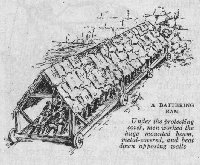 They did not take the long routes by land, whiôh caused so much suffering, but took ships from southern France and sailed in almost a straight line for the Holy Land. They found the Christians already besieging Acre, a seaport not far from Jerusalem. The siege had been long and hard. The Mohammedans were good fighters, since Saladin was their leader.
They did not take the long routes by land, whiôh caused so much suffering, but took ships from southern France and sailed in almost a straight line for the Holy Land. They found the Christians already besieging Acre, a seaport not far from Jerusalem. The siege had been long and hard. The Mohammedans were good fighters, since Saladin was their leader.
But the fame of Richard the Lion-Hearted put new life into the besiegers. Richard was indeed a man to be admired. He was big, strong, and good looking. It was said that no man in England was strong enough to handle the king’s battle ax. In battle no knight was able to keep his seat in the saddle when Richard gave him a thrust with a lance.
Now when Richard and his soldiers came to Acre, the Crusaders took new heart. He showed them where to place their battering rams and “moving towers” so as to do the most good. The stone-hurling machines were again brought into frequent use, and in the end Acre fell. Men said that this result was largely due to the wisdom and courage of Richard the Lion-Hearted.
Again quarrels broke out among the Christians. King Philip went home, but others kept old jealousy and hatred burning. This division among the Crusaders prevented them from winning back Jerusalem. It is said that before he left the Holy Land Richard mounted his war horse and rode up a high hill in sight of the Holy City, but he lifted his shield and held it so that he might not behold the city he could not rescue.
Next
Back to Table of Contents.
© 2001 by Lynn Waterman